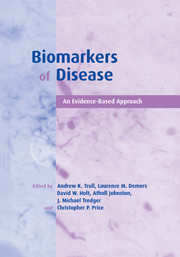Book contents
- Frontmatter
- Contents
- List of contributors
- Preface
- Part 1 Assessing and utilizing the diagnostic or prognostic power of biomarkers
- Part 2 Biomarkers of kidney disease and dysfunction
- Part 3 Biomarkers of bone disease and dysfunction
- Part 4 Biomarkers of liver disease and dysfunction
- Part 5 Biomarkers of gastrointestinal disease and dysfunction
- Part 6 Biomarkers in toxicology
- Part 7 Biomarkers of cardiovascular disease and dysfunction
- Part 8 Biomarkers of neurological disease and dysfunction
- Part 9 Biomarkers in transplantation
- 41 Monitoring heart and lung transplant patients
- 42 Monitoring liver transplant recipients
- 43 Chronic allograft damage index as a surrogate marker for chronic allograft rejection
- 44 Advances in pharmacodynamic biomarkers for monitoring the response to immunosuppressive drug therapy
- 45 The use of biomarkers for monitoring the response to immunosuppressive drug therapy
- 46 Post-transplantation bone disease
- 47 Molecular diagnosis of cytomegalovirus disease
- 48 Diagnosis and monitoring of inflammatory events in transplant recipients
- Index
43 - Chronic allograft damage index as a surrogate marker for chronic allograft rejection
Published online by Cambridge University Press: 20 August 2009
- Frontmatter
- Contents
- List of contributors
- Preface
- Part 1 Assessing and utilizing the diagnostic or prognostic power of biomarkers
- Part 2 Biomarkers of kidney disease and dysfunction
- Part 3 Biomarkers of bone disease and dysfunction
- Part 4 Biomarkers of liver disease and dysfunction
- Part 5 Biomarkers of gastrointestinal disease and dysfunction
- Part 6 Biomarkers in toxicology
- Part 7 Biomarkers of cardiovascular disease and dysfunction
- Part 8 Biomarkers of neurological disease and dysfunction
- Part 9 Biomarkers in transplantation
- 41 Monitoring heart and lung transplant patients
- 42 Monitoring liver transplant recipients
- 43 Chronic allograft damage index as a surrogate marker for chronic allograft rejection
- 44 Advances in pharmacodynamic biomarkers for monitoring the response to immunosuppressive drug therapy
- 45 The use of biomarkers for monitoring the response to immunosuppressive drug therapy
- 46 Post-transplantation bone disease
- 47 Molecular diagnosis of cytomegalovirus disease
- 48 Diagnosis and monitoring of inflammatory events in transplant recipients
- Index
Summary
Introduction
In the last two decades, existing immunosuppressive agents have significantly improved short-term graft survival in renal transplant recipients. However, this improvement has failed to translate into long-term survival [1].
Apart from death with a functioning transplant, chronic rejection has emerged as a leading cause of renal allograft loss [1]. There is currently no specific therapy for chronic rejection. Identification of treatment strategies that result in enduring benefits in the long term has therefore become essential. Any such study on longterm treatment strategies must evaluate the effect of treatment over several years' post-transplantation and will take between 5 and 10 years to complete. This is hardly feasible and, therefore, it has become important to identify and characterize appropriate near-term surrogate end-points [2]. Such a surrogate end-point should be visible between 1 or 2 years' post-transplantation and should predict graft loss 5–10 years' post-transplantation, even if the function of the graft at the time of measurement is normal.
In this chapter, we will briefly describe some silent features of chronic allograft rejection, particularly in kidney transplants, and propose the use of protocol core needle biopsy as a surrogate end-point in clinical studies.
Clinical manifestations and prevention of chronic rejection
Chronic kidney allograft rejection is both a clinical and a histological diagnosis. Clinically, it manifests as progressive deterioration of renal function in the absence of other causes [3]. However, the natural history of chronic rejection is quite variable in terms of the time of onset and speed of progression [4].
- Type
- Chapter
- Information
- Biomarkers of DiseaseAn Evidence-Based Approach, pp. 433 - 441Publisher: Cambridge University PressPrint publication year: 2002
- 1
- Cited by



